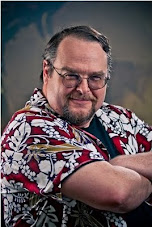So I've been running a Call of Cthulhu campaign for the past few weeks - "Tatters of the King" for a large group of friends. And its been going OK, given that my friends are much smarter than the adventure considers, and they have been keeping me busy. But it has gotten me thinking about Lovecraft's canon and work, and that of others placed in his canon. I think I have broken it down into six general categories. This has been brewing for a while, and while I don't consider myself a Lovecraftian expert, it may provide a basis for more exploration.
(And while I call them generations they are more like rough categories, as the presence of the next gen does not preclude the previous groups)
Generation 0: The Progenitors: These are the fantasy writers that predate the Mythos, who were evoked by Lovecraft and his contemporaries, and, as we shall see, later grouped into the mythos long after their earthy remains had rejoined the soil. Lord Dunsany is here, as is Arthur Machen, and Robert Chambers and his Yellow Sign. They are laying the foundation work for the shared universe that is Lovecraftian horror. They are Romantics to a great degree, and seeking to evoke an emotion in their work.
Generation 1: The Originators. Lovecraft, of course, and I would include Clark Ashton Smith as well. They were notable not only for their writing, but also for the fact that they corresponded frequently (the primitive Internet), critiqued each other, and most importantly, shared their creations back and forth. It was a bit of game in that a Lovecraftian creation popped up in a Smith story and vice versa. We are not looking at a coherent mythos here, as the creations sometimes varied from story to story by the same author (making opportunities for later writers). They are looking for mood and effect, and the mythos horrors are tools to that end. Their motto - "Here be uncaring monsters of the universe- gaze upon them in wonder."
Generation 2: The Organizers. August Derlith, who kept the flame alive, is the central figure of this generation, thought Lin Carter is also of this group and maybe Robert Bloch. These are the folk who have seized on the idea of a unified mythos and expanded it out. They conceived the mythos as an organized pantheon. The downside is that they (Derlith in particular) put into handy slots and assigned elemental sides, the Great Old Ones don't look nearly as great. Their motto: "The Monsters are definable"
Generation 3: The Explainers. Call these the 50s and 60s generations where Lovecraft's horror is adopted fully by Sci-Fi with the result that the gods are not uncaring beings but merely scientfic archtypes. Azathoth is a nuclear reaction, Cthulhu the dreamstate id, and the Mi-go are from Pluto, not Yuggoth. Fritz Lieber was the American version of this generation, but the king was Brian Lumley, who converts the big bads of the Cthulhu mythos into hapless villains to be foiled by Titus Crow, who travels through space and time in a grandfather clock that is bigger on the inside than the outside (What is this "Doctor Who" of which you speak?). I'd throw a lot of Lovecraftian movies into this bunch where they seek to explain the mythos. Their motto: "The Monsters are nothing more than science. They can be beaten".
Generation 4: The Gamers. We jump track entirely from short fiction to RPGs as the chosen vector for expansion. The Call of Cthulhu game by Sandy Peterson, of course is the heart here, but Lovecraftian tentacles are found throughout the gaming industry, right down to the D&D mind flayers. The gamers went back to the hopelessness of fighting the mythos to create a different type of story than the standard RPG "Kill-the-monster-take-the-treasure". As they expanded, they are more responsible for gathering up the Generation 0 and Generation 1 creators and putting them into a one-stop shop for all your mythos need. The team-approach of Derlith is pushed aside as is the rational successes of Titus Crow and his crowd. Their motto: "The monsters are unbeatable - take what solace you may."
Generation 5: The Gamers II? The Interior Horrors? The Apocalyptics? The Pagans? A different type of story showed up with Delta Green RPG, and the works of Glancy, Tynes, and Detwiller. A break with the attitude of the earlier game, part of it harks back the Titus Crow level recognization of the Mythos and people actively fighting it, though that battle is lost (The origin of this branch goes all the way back to "A Shadow Over Innsmouth" with the government sealing the down and depth-charging the reef). But it also builds a connection between us and these eldritch creations, as the protagonists do horrible things in order to prevent greater horrors. In short: We are becoming the Monsters we fear".
Anyway, these ideas have been bouncing around in my brain for a while now, and I just wanted to get them out so other things can replace them. I'm not sure if they are valid categories, nor doubt that others could pare the mythos differently. But its a start.
More later,
The Cat Report
-
Glad to learn that Baseball has gone to his new home and by now is getting
to know his new people.
The cat room now has three cats: senior cat Bettie...
5 days ago


